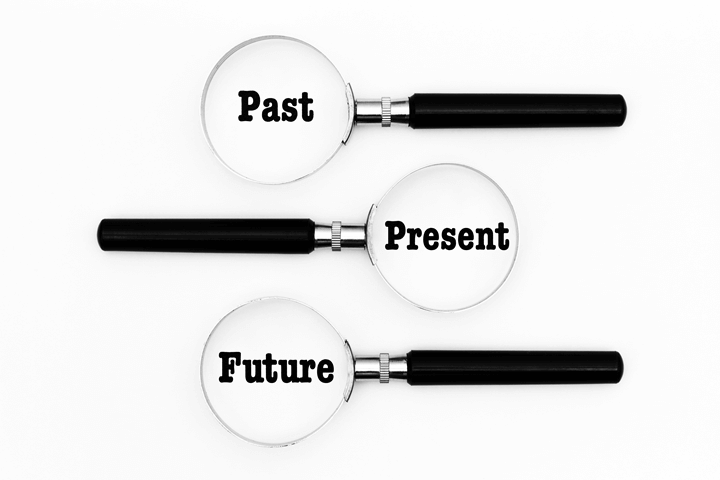Talking about what’s next is a vital part of everyday communication. If you’ve already mastered the past and present tenses in Arabic, it’s time to look ahead! The future tense in Arabic allows you to express plans, predictions, and promises. This article will guide you through the simple yet effective ways to form future tense in Arabic words and master the future tense in Arabic with examples, helping you confidently speak about what’s to come.
The Foundation of the Future Tense in Arabic
Unlike English, which often uses auxiliary verbs like “will” or “going to,” the future tense in Arabic grammar is built directly upon the present tense verb. You primarily add a simple prefix to indicate future action.
- The Present Tense as a Base: To form the future tense, you always start with the present tense form of the verb.
- The Future Prefixes: Arabic uses two main prefixes to indicate the future:
- (sa-) سَـ : This prefix is attached directly to the beginning of the present tense verb. It typically indicates an action in the near future or an immediate intention.
- (sawfa) سَوْفَ : This word is placed before the present tense verb. It generally indicates a more distant future or a more definite plan, though in many contexts, it can be used interchangeably with سَـ.
Conjugating Future Tense in Arabic Words
Let’s see how these prefixes work with present tense conjugations. We’ll use the verb يَذْهَبُ (yaðhabu – he goes/will go) as our example. Remember, the core present tense verb changes based on the person, number, and gender.
- I will go: سَأَذْهَبُ (saʾaḏhabu) or سَوْفَ أَذْهَبُ (sawfa ʾaTHhabu)
- (Present tense: أَذْهَبُ – ʾaTHhabu)
- We will go: سَنَذْهَبُ (sanaTHhabu) or سَوْفَ نَذْهَبُ (sawfa naTHhabu)
- (Present tense: نَذْهَبُ – naTHabu)
- You (masculine singular) will go: سَتَذْهَبُ (sataTHhabu) or سَوْفَ تَذْهَبُ (sawfa taTHhabu)
- (Present tense: تَذْهَبُ – taTHhabu)
- You (feminine singular) will go: سَتَذْهَبِينَ (sataTHhabīna) or سَوْفَ تَذْهَبِينَ (sawfa taTHhabīna)
- (Present tense: تَذْهَبِينَ – taTHhabīna)
- You (plural masculine) will go: سَتَذْهَبُونَ (sataTHhabūna) or سَوْفَ تَذْهَبُونَ (sawfa taTHhabūna)
- (Present tense: تَذْهَبُونَ – taTHhabūna)
- You (plural feminine) will go: سَتَذْهَبْنَ (sataTHhabna) or سَوْفَ تَذْهَبْنَ (sawfa taTHhabna)
- (Present tense: تَذْهَبْنَ – taTHhabna)
- He will go: سَيَذْهَبُ (sayaTHhabu) or سَوْفَ يَذْهَبُ (sawfa yaTHhabu)
- (Present tense: يَذْهَبُ – yaTHhabu)
- She will go: سَتَذْهَبُ (sataTHhabu) or سَوْفَ تَذْهَبُ (sawfa taTHhabu)
- (Present tense: تَذْهَبُ – taTHhabu)
- They (masculine plural) will go: سَيَذْهَبُونَ (sayaTHhabūna) or سَوْفَ يَذْهَبُونَ (sawfa yaTHhabūna)
- (Present tense: يَذْهَبُونَ – yaTHabūna)
- They (feminine plural) will go: سَيَذْهَبْنَ (sayaTHhabna) or سَوْفَ يَذْهَبْنَ (sawfa yaTHhabna)
- (Present tense: يَذْهَبْنَ – yaTHhabna)
Future Tense in Arabic with Examples: Putting it into Practice
Let’s look at more concrete future tense in Arabic with examples for various verbs:
- To eat (يَأْكُلُ – yaʾkulu):
- I will eat tomorrow. – سَأَكُلُ غَدًا (saʾkulu ghadan.)
- They will eat at the restaurant. – هُمْ سَوْفَ يَأْكُلُونَ فِي الْمَطْعَمِ (hum sawfa yaʾkulūna fī al-maṭʿami.)
- To drink (يَشْرَبُ – yašrabu):
- You (fem.) will drink the juice. – أَنْتِ سَتَشْرَبِينَ الْعَصِيرَ (anti satašrabīna al-ʿaṣīra.)
- هُوَ سَيَشْرَبُ الْقَهْوَةَ صَبَاحًا (huwa sayašrabu al-qahwata ṣabāḥan.) – He will drink coffee in the morning.
- To return (يَرْجِعُ – yarjiʿu):
- We will return in a little while. – نَحْنُ سَنَرْجِعُ بَعْدَ قَلِيلٍ\ (naḥnu sanarjiʿu baʿda qalīlin.)
- She will return home late. – هِيَ سَتَرْجِعُ إِلَى الْبَيْتِ مُتَأَخِّرَةً (hiya satarjiʿu ʾilā al-bayti mutaʾakhkhirah.)
Negating the Future Tense in Arabic
Saying what you won’t do in the future is also straightforward. You use the particle لَنْ (lan) before the present tense verb. When لَنْ (lan) is used, the verb’s ending changes to the accusative case (usually indicated by a fatḥa on the last letter for most verbs), rather than the nominative case (ḍamma).
- (lan ʾašraba al-qahwata ghadan.) – لَنْ أَشْرَبَ الْقَهْوَةَ غَدًا – I will not drink coffee tomorrow. (Note: أَشْرَبَ instead of أَشْرَبُ)
- (hum lan yaTHhabū ʾilā al-ḥaflati.) – هُمْ لَنْ يَذْهَبُوا إِلَى الْحَفْلَةِ – They will not go to the party. (Note: يَذْهَبُوا instead of يَذْهَبُونَ)
Conclusion: Planning Ahead with Arabic Verbs
Mastering the future tense in Arabic is an exciting step in your language journey. By simply adding the prefixes سَـ (sa-) or سَوْفَ (sawfa) to the present tense verb, you can confidently express future actions. With the future tense in Arabic with examples provided, you’re now equipped to make plans, discuss upcoming events, and predict what lies ahead. So, go forth and talk about your future in Arabic!
Ready to unlock even more Arabic grammar and vocabulary? Download the Kaleela Arabic Language Learning app today and continue your journey towards fluency!



